 About GamePeople
About GamePeople
Subscribe to the Novel Gamer column:![]() RSS or
RSS or
![]() Newsletter.
Newsletter.
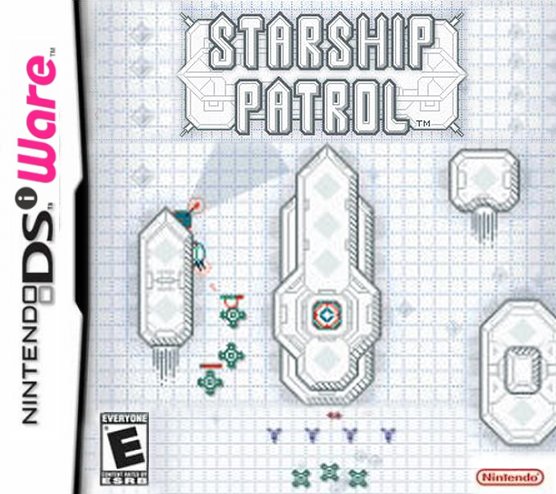
Format:
DSi-Ware
Genre:
Shooting
Further reading:
Download
iTunes
Buy/Support:
Support Chris, click to buy via us...
Other GamePeople columnists have reviewed this from their perspective - huh?:
Returning Gamer (DS)
Teaching Gamer (DS)
Magnetic Gamer (DS)
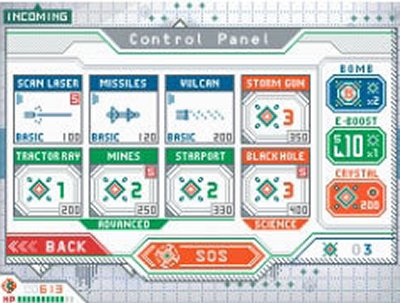
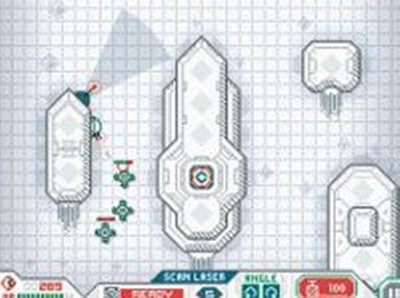
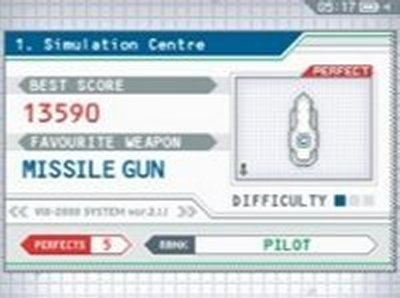
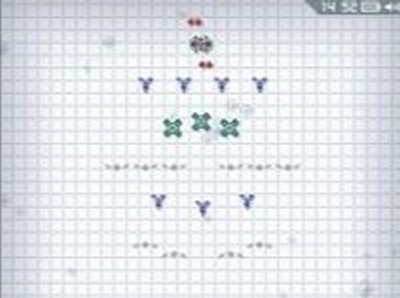

Commander on Trial: On trial for competency, a space fleet commander must justify his actions and approach to a controversial fleet battle.
Download, subscribe via ![]() iTunes,
iTunes, ![]() Podcast RSS or
Podcast RSS or ![]() Email.
Email.
Across the stars, nestled between floating chunks of space rock and debris, the Space Station Zenobia drifted along in its quiet orbit between the planetary mass hundreds of miles below and the nearby moon. Commander Jayston stood up from his seat in the congregational chamber and placed his hands on the wooden bar of the dock. He faced the panel of senior officers before him and awaited their instruction. Admiral Langford eyed him impatiently, as if unaware that the assembled court was waiting upon his word to commence. His head was slightly bowed and he frowned as he stared at Jayston through thick white eyebrows. He opened wide a thin pair of cracked, wrinkled lips to reveal a small row of yellowed, gravestone teeth and barked commands. "Well, man? The oath! Get on with it." Commander Jayston raised his hand in the air. "I swear that my testimony shall be the truth, the whole truth and nothing but the truth." The Admiral clicked his tongue in acknowledgement and straightened up, eyeing the assembled crowd. "In that case," he declaimed, "I declare this initial meeting of the military competency hearing panel open." He locked eyes with Commander Jayston once more, "you understand that the purpose of this hearing is to hear a full account of your version of the events that took place on the outer rim during your campaign?" Jayston replied, "yes, sir." The old man continued, almost without waiting for the response "and you understand that this hearing is not questioning the outcome of that campaign - generally considered to be quite satisfactory - but rather to establish the efficacy of your conduct and approach in its execution? There are a number of areas in which your performance has been called into question, on the basis of the official logs, recordings and witness testimony." "Yes, sir." Another officer to the Admiral's right, whose name plaque declared him to be Admiral Bryant, spoke up. "Perhaps, Commander, you could begin by telling us how the conflict started?" "We set out to perform a routine survey of an alien system, but were set upon at every turn. Nevertheless our orders were to proceed with the mission." Jayston replied. Admiral Langford curled his lip. "I see," he growled, menacingly, "and that brings us to the first of your engagements with the enemy. Can you explain to us, Commander, exactly why you went into your first battle with the enemy entirely un-armed?" "Well, sir," Jayston stammered, "The ships had been built with a number of standard mounting-ports to which weaponry could be assembled at short notice -- however due to the available resources we did not have any standing defences." The panel murmured and shared glances between themselves. "So what did you do when the first enemy craft began attacking?" "We generally have enough resource budget for two slow-repeating lasers or one missile silo depending on circumstance. Owing to our tactical systems we were able to predict the flight path of each enemy wave. We placed the weapons such as we had in what I felt to be the optimum position to handle each encounter. As the enemy fell, we recovered what resources we could from these craft and converted them into additional weapons as the exchange continued." "And this is standard practice, is it?" Admiral Langford enquired. Commander Jayston nodded, curtly, "in these kinds of engagements, I believe it to be a common type of defensive strategy." "So," Admiral Langford cut in, "you faced the enemy with your fleet, based upon a hand-to-mouth strategy whereby the resources generated by one defeated wave would feed into your defences for further attacks?" The defendant nodded once more, trying to anticipate the Admiral's next barbed comment as accurately as his ship was able to determine an enemy's flight path. The Admiral leant back languorously in his chair and cast a hand theatrically around the assembled room. "Am I the only person present who feels it would be a more appropriate strategy to meet the enemy with a properly prepared and equipped defence grid? Rather than deploying weapons one at a time to meet specific engagements?" His voice rose dramatically in line with the hyperbole. "But, Admiral," Commander Jayston protested, "we really only had enough budget to deploy two weapons!..." There was a general murmuring in the court which had to be quietened by the officer on the other end of the panel, another Admiral by the name of Bellingham. Admiral Langford himself leaned toward Jayston and smiled sweetly. It reminded Jayston of the way a crocodile looks as it glides effortlessly through the water. He gulped, involuntarily. "That budgetary issue being the case, Commander," the Admiral said, at last, breaking the tension, "with what defences did you begin the second engagement?" Jayston chewed on his lip, "ummm, none, sir." Langford put on a faux expression of confusion, "but by the end of the first battle you must have amassed quite a sizeable arsenal?" Why was this not re-deployed when the enemy attacked a second time?" Silence fell heavily upon the room, awaiting Jayston's answer. He finally said, simply, "I don't know, sir." The Admiral pursued him, "I cannot think of a good reason why the resources available to your fleet should not be made available in subsequent battles. Can you?" Commander Jayston simply shook his head. The three admirals behind the long counter exchanged glances with one another and then bowed their heads to make notes, almost in unison. Admiral Bellingham spoke next, "Commander, perhaps we could move on to the issue of your performance in the individual skirmishes. This appears to be a very mixed area. In some battles you display an exemplary performance -- occasionally leaving the enemy without a single remaining unit -- while in other battles you barely escape with your fleet intact. Do you have an explanation for this fluctuation in your abilities?" "Yes, sir, I do," Commander Jayston replied hopefully, "I believe that the primary responsibility for our variable success with the enemy must lie solely at the feet of our Research and Development department." This prompted an explosion of coughing and outraged bluster from Admiral Langford. "What?" he demanded, "you blame the weapons development team for this? Explain yourself!" "Certainly, sir," Jayston replied, "throughout the campaign, R&D occasionally provided new weapons based on their work and the alien encounters. However, the enemy demonstrated time and time again that they were capable of deploying cloaked ships which were impervious to all but a minority of our weapons. In spite of the effectiveness of these enemy units and the problems which they caused us in our defence, R&D failed to provide any weaponry which was effective against these craft. In desperation I had to form my own approach -- while the mine layers are generally ineffective they do cause the enemy ships to de-cloak at which point better weapons could be brought to bear. However the effectiveness of mines is unpredictable and results are largely random. Sir." Admiral Langford had an expression on his face which looked as though he were trying to remove stuck gum from the roof of his mouth. "I see," he eventually replied. Bellingham chipped in, "but it's not all down to the weapons, is it? Some of the targeting is off! Why we have pictures here which show your most effective weapons firing upon lone, weak targets while elsewhere three heavily armed fighters attack your ship!" Commander Jayston retorted, quickly, "I have very little control over the targeting, sir. All I can specify is an area in which the guns will fire. They choose their own targets -- very poorly if I may say so, sir." "And to what," Langford said, slowly, "do you attribute this failure?" Jayston thought for a moment, carefully -- he didn't want to dig himself further into a hole but he didn't feel he could go any longer without raising this particular issue. "I think the fault is the graphics display, sir." The admirals raised a line of eyebrows, almost as if choreographed. "The tactical display looks like.. like.." he struggled for the right words, "well sir it looks like it's been hand drawn on lined paper! It's hardly representative of a real battle, is it? Umm, Sir." Admiral Bryant asked him, "what would you prefer?" The young Commander was a little taken aback by this question, "well Sir... I ... ummm... think it would be more effective, given the setting, to be presented with a realistic camera display of the ships involved in battle." Langford picked up his colleagues line of questioning. "Commander, what colour is space?" "Black, sir." "And are most of the enemy ships a brilliant white, or a different colour?" "Umm mostly darker colours than white, sir." "And the projectiles and resources involved -- are they dark or light colours, in reality?" Jayston's heart felt like it was plummeting through depths to rest at the bottom of a deep lake. "They are dark colours, sir." Admiral Bellingham said, "whereas the graphical display for your fleet's command console displays the enemy on white screens with clear black outlines and makes all resources and projectiles very clear." The Commander chose to not respond to this statement. "Do you still feel that the display style is at fault, Commander?" Langford asked him, bluntly. "No sir." Jayston replied. What else could he say? He watched dust particles dance in the rays of light coming through the viewports behind the panel. Was this to be the end of his career? The three admirals adjourned to a private room to discuss the facts. It seemed to Jayston as though there was no hope. The waiting seemed eternal, although in actuality less than five minutes had passed. The ante-room door opened and the three stooped, elderly soldiers filed back into the room. Admiral Langford looked intently into Jayston eyes. "Having looked at the records of your performance and the overall outcome of the campaign -- as well as other mitigating factors -- we find no grounds on which to bring charges of misconduct or competency. You are free to leave." Jayston was stunned; but at the same time he was suddenly curious. "If I may ask, sir... what other mitigating factors?" The panel simply stared at him and offered no response. Moments earlier, the panel of three judges had congregated in the ante-room behind the congregational chamber. They exchanged glances. "Well," Bryant was the first to speak, "what do you think of it all?" Langford growled, "I don't like him. Starting a battle with no defences, refusing to redeploy weapons once they are positioned...." Bryant cut in, "his records indicate that he found the budgetary cost of removing a weapon once it was installed was prohibitive to making any changes. His complaint about this is noted in his report." There was a moment where nobody spoke -- just thought about how to pass judgement on this episode. Admiral Bellingham cleared his throat, softly and with a conspiratorial tone, suggested "we could of course look at this from a sideways perspective. Due to the way in which Jayston's fleet is housed he can be called upon at a moment's notice -- rather than some other war games which require us to find the appropriate records and install them. Also, this whole incident hasn't cost very much." "Cost?" Langford demanded, "what do you mean?" "Well," Bellingham continued, "according to our records this whole affair has only cost our department 500 DS Points." Langford and Bryant looked at each other and raised an eyebrow. "We should probably overlook a few indiscretions, then?" Bryant offered. Admiral Langford nodded gravely, "I think," he announced with an air of pontification, "that that is exactly what we should do."



Chris Jarvis writes the Novel Gamer column.
"I write stories to say what I think about games, for me it's the only way I can really communicate what I feel about them. Do you ever have a response to something that's hard to put into words? I find that sometimes I have something to express that can't be communicated by trying to explain how I feel, directly."
Here are the games I've been playing recently:
© GamePeople 2006-13 | Contact | Huh?

|
Family Video Game Age Ratings | Home | About | Radio shows | Columnists | Competitions | Contact
With so many different perspectives it can be hard to know where to start - a little like walking into a crowded pub. Sorry about that. But so far we've not found a way to streamline our review output - there's basically too much of it. So, rather than dilute things for newcomers we have decided to live with the hubbub while helping new readers find the columnists they will enjoy. |
Our columnists each focus on a particular perspective and fall into one of the following types of gamers:
|